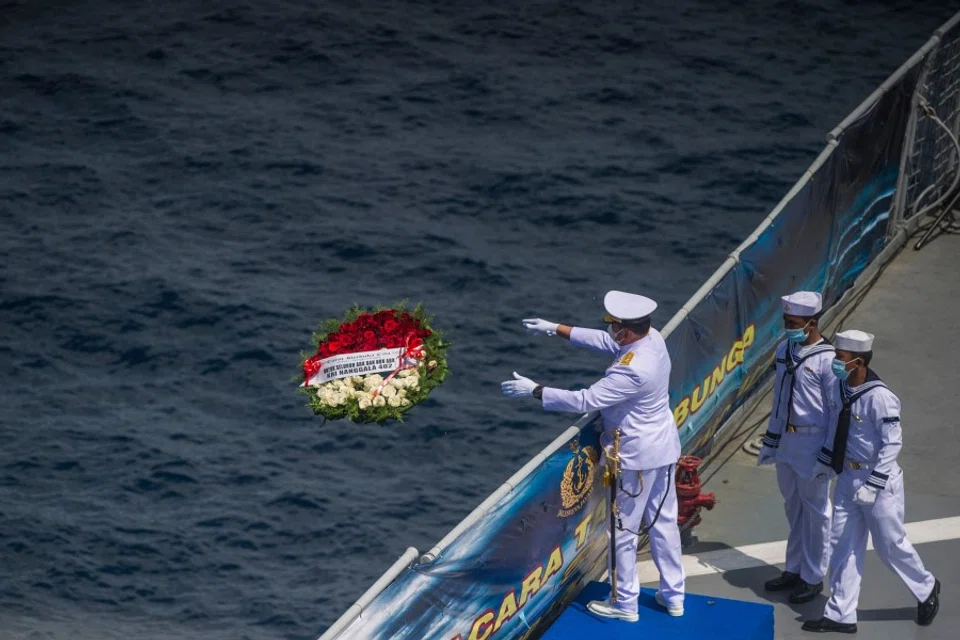Why Beijing offered to help raise the sunken Indonesian submarine Nanggala
China recently offered assistance to Indonesia in salvaging the sunken Indonesian submarine KRI Nanggala 2 in the Bali Sea. The submarine was lost on 21 April with its 53 crew members. ISEAS senior fellow Ian Storey examines Beijing's other intentions besides altruism.

In May and June, China embarked on a new defence diplomacy mission in Southeast Asia for the first time ever: the attempted recovery of the sunken Indonesian submarine KRI Nanggala 2. The attempt was called off in the end, but the effort has not stopped observers from asking questions about Beijing's ultimate intentions.
The 40-year old 2,000-tonne vessel sank in the Bali Sea on 21 April with the tragic loss of 53 crew members. As soon as the vessel was reported missing, Singapore, Malaysia, India, Australia and the US sent naval and air assets to help Indonesia in the search for the stricken submarine. It was located a few days later 800 metres below the surface, broken into three pieces. The causes of the tragedy are still unknown.
In early May, Indonesia accepted a cost-free offer from China to help salvage the warship. China deployed a marine research vessel (equipped with manned submersibles capable of diving to depths of over 10,000 metres), a salvage and rescue ship (equipped with two Deep Submergence Rescue Vehicles) and an ocean-going tug.

Over the next four weeks, the Chinese submersibles conducted nearly 20 dives to the site of the wreck, retrieving a variety of items including life rafts and other equipment. However, an attempt to raise a 20-tonne section of the submarine using sling cables failed. No bodies were recovered. The operation was called off in early June and the Chinese ships returned home. It remains unclear whether there will be further attempts to salvage the submarine.
It is worth noting here that since the early 2000s, China has significantly expanded its defence diplomacy activities in Southeast Asia. The value of China's arms sales to the region has increased, while the People's Liberation Army has upped the frequency of high level exchanges and military training exercises with its regional counterparts.
But China has no experience in salvaging warships from the bottom of the sea. So why did Beijing offer to help Indonesia raise the Nanggala?

The fact that China offered Indonesia assistance in salvaging the stricken sub speaks volumes: expertise for such endeavours is not within the reach of many entities in the world. Submarine operations are among the most complex and dangerous activities a navy can undertake, and since 1945 more than a dozen submarines have been lost at sea, usually due to fires or explosions. Because of the dangers of operating at great depths, including unexploded ordnance aboard, prior to the Nanggala mission, only two attempts had been made to raise sunken submarines.
In 1974, the Central Intelligence Agency used a deep-sea drilling ship equipped with a giant claw in an audacious attempt to raise a Soviet submarine that had sunk in the Pacific Ocean in 1968 with the loss of all hands. But only one-third of the vessel was recovered. In 2001, a Dutch company with long experience in salvage operations successfully raised the Russian submarine Kursk which had sunk in the Barents Sea earlier that year killing all 118 crew members.
As the PLA-Navy has rapidly grown its fleet of submarines - and especially since an accident aboard a submarine in 2003 that killed 70 personnel - it has invested significant resources in submarine rescue capabilities. But China has no experience in salvaging warships from the bottom of the sea. So why did Beijing offer to help Indonesia raise the Nanggala?
There are three possible reasons, one of which highlights how participating in defence diplomacy activities with another country can sometimes be a double-edged sword.

The first reason is genuinely altruistic. Sailors are bound together by the brotherhood of the sea. When a warship gets into difficulty, offers of help are instinctively proffered by both friends and frenemies alike. A spokesman from China's defence ministry was undoubtedly correct when he described the attempted salvage of the Nanggala as "an important humanitarian rescue operation" which also contributed to enhancing mutual trust and cooperation with regional militaries.
The second reason is self-interest. Beijing may have calculated that the PLA-Navy's high-profile efforts might help improve public perceptions of China in Indonesia which have recently declined due to rising tensions between the two countries in the South China Sea. That the operation was only partially successful is immaterial: China made the effort while other major powers did not.
...while defence diplomacy activities are aimed at building trust and habits of cooperation between the armed forces of two countries, they can also be used as a convenient method of gathering information about the other country's capabilities and geographical environment.
The third and more crafty reason is that China may have used the operation to gather hydrological data to be used by its own submarines in Indonesia's strategically important archipelagic sea lanes that link the Indian and Pacific Oceans. Indeed, sources which spoke to the Chinese media were remarkably candid when they said the Nanggala operation could help China "study the maritime military geography of the area" and that this information "would be beneficial" to the PLA-Navy.

Recently, suspicions have been raised that China has been collecting deep sea data in Indonesia. In 2019 and 2020, three Unmanned Underwater Vehicles (UUVs), believed to belong to China, were found in Indonesian waters. The UUVs can be used to gather bathymetric data vital in the preparation of underwater charts which submarines use to navigate safely. And in January, Indonesia's coast guard had to escort a Chinese survey ship from the country's EEZ because it had been conducting unauthorised scientific research in the Sunda Strait with its tracking transponder switched off for long periods of time. The strait is part of Indonesia's archipelagic waters.
The Nanggala salvage operation underscores the uncomfortable reality that while defence diplomacy activities are aimed at building trust and habits of cooperation between the armed forces of two countries, they can also be used as a convenient method of gathering information about the other country's capabilities and geographical environment.
This article was first published by ISEAS - Yusof Ishak Institute as a Fulcrum commentary.





